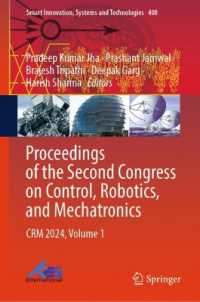- ホーム
- > 洋書
- > ドイツ書
- > Mathematics, Sciences & Technology
- > Physics and Astronomy
- > general surveys & lexicons
Full Description
One of the more contentious questions to emerge into scientific prominence has been whether life is prevalent in the cosmos. Although there are many factors that shape this debate, one of the most overlooked yet crucial rests on the temporal organization in biotic systems.
In this work the author investigates the compatibility and incompatibility between the thermodynamic arrow of time indicative of abiotic structure, and the temporal organization so characteristic of biotic processes and uses it to explore the origins of life here and elsewhere. Far from a minor problem, the author argues that the temporal organization in biotic systems plays a key role in shaping not only the prevalence of life, but also in grounding the scientific theories we use to explain the universe and the moral concepts that will anchor our exploration of the larger cosmos.
Contents
Introduction.- The Revolutionary Implications of Astrobiology.- Are Math and Logic Universal Throughout the Cosmos?.- How Important Is Time for Understanding Life in The Universe?.- Is Ethics just for Humans?.- Conclusion -- How to Think about a Beginning That Never Ends: Unlikely Lessons from Hegel and Badiou.- Index.- Bibliography.







